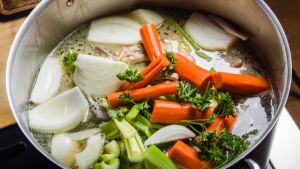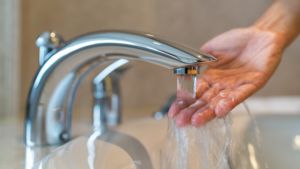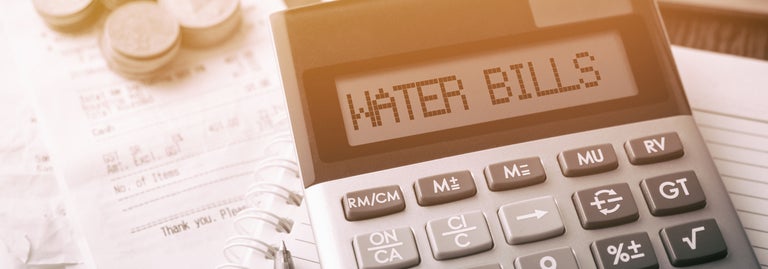Have you noticed a spike in your water usage recently? With the kids at home, maybe you’re giving the dishwasher an extra workout each day as the cups and plates pile up. Maybe you’re doing more laundry loads. If you’re worrying that you’re pouring good money down the sink, Canstar shares 15 creative ways to start saving on your water bills.
It is possible to save a decent amount of money by being more conscious of water usage, and if you’re using a lot of hot water, you could also lower your power bill.
According to Auckland council’s Watercare, the average household daily water usage in the City of Sails is between 140 and 175 litres. Showering and doing laundry use the most H2O in the home, whereas running your garden hose for an hour can use up to a whopping 400 litres and cost around $1.39, depending on your water pressure. So, with winter approaching, what can you do to cut down costs? We all know about taking shorter hot showers, but here’s some ideas you might not have thought of:
1. Reuse cooking water
How many times a week do you steam or boil vegetables? Often that leftover water ends up down the drain. Next time, save the water and use it to make vegetable stock for a soup or sauce.

2. Put a basin in the kitchen sink to catch water from rinsing dishes and veggies
Think about putting a basin in the sink with a line near the top. Whoever fills it to the top of the line becomes responsible for taking it out to water the veggies/garden. It’ll likely be filled more slowly over time, because let’s be real, no-one wants to be the one to empty it. Everyone will become very aware of how fast the water is running, and how much they use.
3. Wash dishes in the biggest dirtiest pot/bowl
So you made dinner and now you have a sink full of dirty dishes. Consider taking the biggest pot or bowl you used, filling it with hot soapy water and washing the dishes using this water instead of filling up the sink. You’ll likely save water, and you’ll be washing the dirty pot/bowl too.
4. Turn off the shower when you’re lathering up and shampooing
This is a simple one. Simply lather up your shampoo with the shower off. The same goes for shaving your legs. You’ll save a lot of hot water if you stick to this rule.
5. Avoid running tap water until it’s cool to drink by refilling a bottle in the fridge
Also, use just one cup per day for your drinking water, instead of using a clean one each time you take a drink. Apply the same rule for your kids, too, and consider reusing plates if they’re still clean. This will cut down on the huge amount of crockery a family can get through during a day at home.

6. Take showers as soon as others are done
The actual science behind this one is blurry, but I know in my household if I shower straight after my partner the water from the shower comes out hot immediately. If you take a shower before the water in your pipes has cooled down, you won’t have to stand there shivering for the cold spray to turn hot, thus saving water and power.
7. Double-dip dishes
Make use of dual sinks if you have one. Instead of letting the water run while you wash dishes, fill one sink with hot soapy water for washing and the other with cold water for rinsing. If your sink is a single model, you can use two large bowls for washing and rinsing.
8. Wash your fruits and vegetables in a pot of water
Don’t leave the rap running while you scrub your potatoes. Put a bowl under the tap! Then reuse it to water your plants.
9. Don’t flush every time
This is probably the easiest way to save water. While some more modern toilets can use as little as three litres of water per flush, some older style toilets use closer to 15 litres per flush. Rather than wasting water, think about minimising the amount of times you flush the toilet per day and stick to the motto: if it’s yellow, let it mellow; if it’s brown, flush it down. This tip might not be everyone’s cup of tea, but you’ll be doing the environment and your water bill a favour.
10. Stop brushing your teeth in shower
This may sound like an odd one, but to the culprits, stop brushing your teeth with the shower running. It adds at least an extra two minutes to your shower that aren’t really necessary.
11. Mind your hose usage outside
Really think about what you’re using your hose for. Can you wash your car or bike with a bucket of water instead? Can you water your plants with a watering can? If you do use a hose, use a spray gun with an adjustable pressure nozzle, that you can trigger on and off as needed.
12. Save bath water to water plants
Instead of emptying out a bath, water your plants with it, they won’t mind!

13. Check for leaks
Keeping an eye out for leaks in your plumbing could save you some serious coin. How to check for obvious leaks? According to Watercare NZ:
- Look for dripping taps.
- Look behind your dishwasher and washing machine for any signs of water.
- Check your toilet cistern. Put a few drops of food colouring in the cistern. If colour ends up in the toilet bowl without flushing, you have a leak.
- See if the hot water cylinder expansion relief valve is letting water drip into the gully trap.
- In dry weather, look for damp patches in your garden, lawn or driveway.
- Listen for running water inside your home when no taps, hoses or showers are turned on.
- If you do find a leak, you might be able to claim a leak allowance from your water provider. This is a credit on your bill towards payment for a prompt fix of the leak.
14. Use the right settings
Washing machines and dishwashers come with a variety of settings and most have water-saving and eco-washes, so make sure you use them. Not only will they save you water, they will also save you power, which is something Canstar can also help you with. If you’re thinking about changing power retailer for a better deal, check out our free comparison tool, which rates electricity providers on value for money:
Compare electricity providers for free with Canstar!
15. Stop pre-rinsing your dishes
Yes, you heard us right. If you’re spending time rinsing your dirty dishes thoroughly before putting them in the dishwasher, you might as well be washing them by hand. You should always scrape off food scraps before you wash plates and utensils, but that’s the only step your dishwasher can’t handle. Your dishes need to be dirty for the dishwasher detergent to do its job. Enzymes in detergents are designed to attach themselves to food particles, so back away from the sink!
If you usually use water sparingly, have ruled out a leak and still have a high water bill …
… your bill may be higher for a number of reasons. Consider:
- Have family or friends been visiting? When you have extra people living at your property water usage will be higher.
- Have you installed new appliances that use more water?
- Have you used your washing machine or dishwasher more often?
- Has your water usage outside changed, for example filling a child’s paddling pool or watering more?
If you do think there’s been a miscalculation, then it pays to contact your water provider immediately, for the sooner you bring it to their attention, the sooner you can find a solution.
Enjoy reading this article?
Sign up to receive more news like this straight to your inbox.
By subscribing you agree to the Canstar Privacy Policy


Share this article